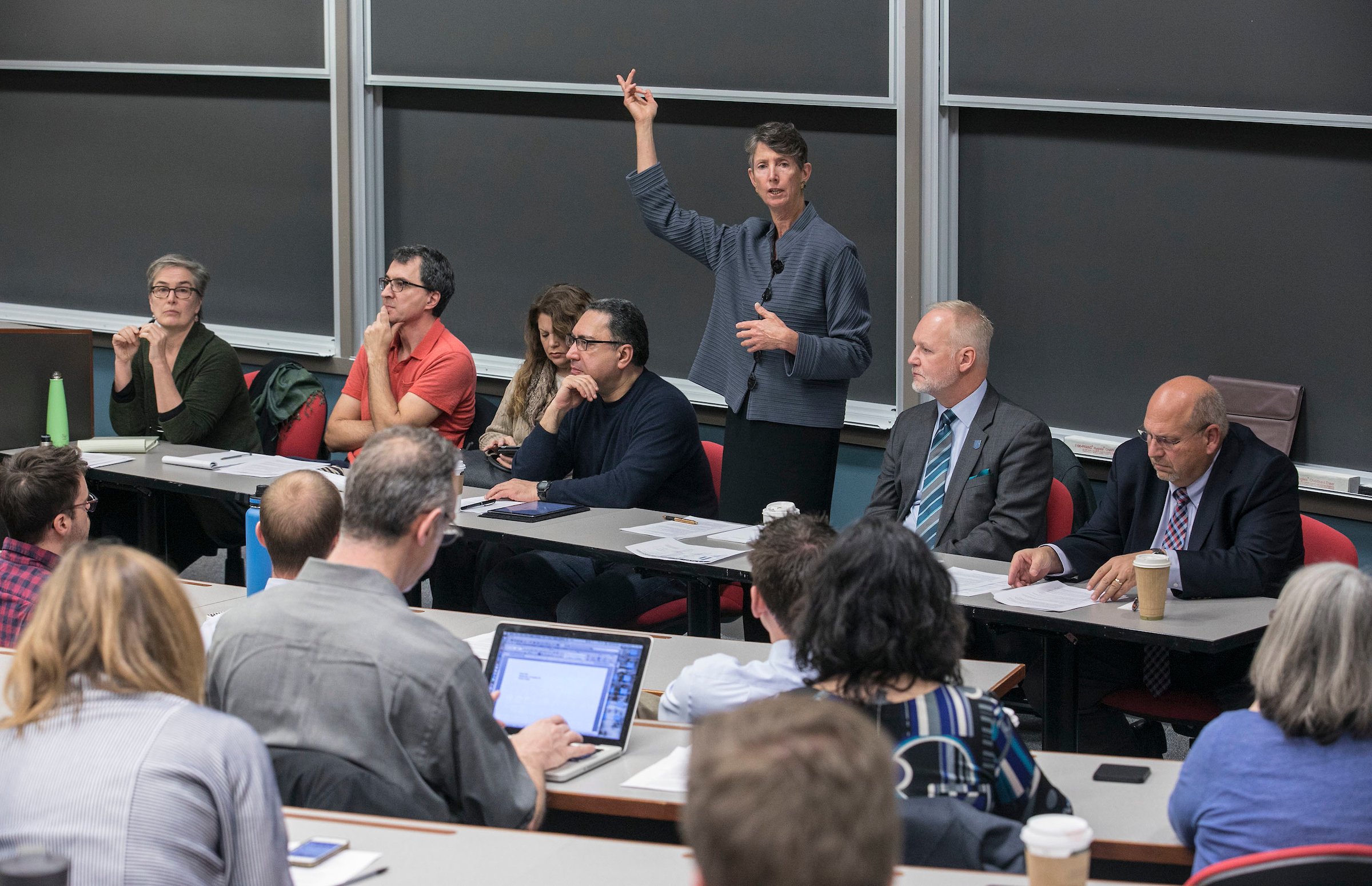 Jay Braatz, vice president for planning and presidential administration in the Office of the President, asks a question of the more than 100 attendees gathered for the second round of town hall meetings hosted by the Strategic Planning Task Force. (DePaul University/Jamie Moncrief)
Jay Braatz, vice president for planning and presidential administration in the Office of the President, asks a question of the more than 100 attendees gathered for the second round of town hall meetings hosted by the Strategic Planning Task Force. (DePaul University/Jamie Moncrief)
Jaclyn Jensen attended the Loop Campus town hall meeting in November to raise awareness about organizational behavior, one of her areas of expertise. The associate professor and faculty director of the Human Resources Program in the department of Management and Entrepreneurship told the roughly 100 people who attended, "We need to understand that this strategic plan needs to be part of a massive change effort."
Jensen was one of many at the town halls who suggested this plan will need to be about change and innovation. The landscape of higher education is changing dramatically and universities need to think in creative ways to respond. Town hall participants spoke about what is distinctive at DePaul and how we might best leverage our strengths to respond to these challenges. Questions explored included, what do we need to build to serve the students of the future? How might we change organizationally to continue to strengthen our academic programs and educational services for our students? How do we improve the value of a DePaul education?
Several participants echoed the idea that, in order to build upon its strengths and continue to educate the next generation of students, the DePaul community must adapt to a number of external factors. Students will be diverse in different proportions than in the past. DePaul will have fewer 18-year-olds, more first-generation students, as well as more military veterans and working adults seeking career changes or requiring new skills. DePaul will need to serve them in new ways, such as offering more night and online classes.
"We are creatures of habit," Jensen told the crowd of faculty, staff and students gathered in DePaul Center. "How on-board is everyone for change? How is the university going to support that change?"
She suggested that DePaul deploy change management, which is a process that teaches organizations and their employees to support and adopt change to improve organizational outcomes.
"It's helping people understand why change is needed, if or how their roles will change, identifying obstacles or barriers to change, and planning ahead to overcome resistance. At DePaul, this is particularly important given what is at stake - the long-term future of the institution," she says. "It is important to really help faculty and staff understand why we need to do things differently, and empower individuals to participate and take ownership of the process."
Ruben Parra, director of the Office for Teaching, Learning and Assessment and professor of chemistry, also attended the town hall meeting.
"We need to be imbued with the changes DePaul is making if we are to be the agents of change," he says. "We need to make the choice to be better, to be the change."
Parra would like to see more faculty participate in the various development programs offered by TLA so that they can improve their teaching and better support students.
"People get most of their information from their direct line manager," says Debbie Harris, a 38-year DePaul veteran, Staff Council member and project manager in Information Services who attended the town hall.
"We need good manager communication. We need to make sure this information is being communicated to managers since that is who people are going to listen to," she says.
So what does a good change management initiative look like and what will it achieve?
Jensen explains it creates buy-in through a participatory planning process, recognizes the inherent stress and tension associated with change and helps employees manage their concerns. Furthermore, everyone is held accountable for ensuring that the necessary change occurs systematically and rigorously.
"A successful change effort should invest the necessary resources so DePaul is ready to act on its new strategic priorities, and emphasize continuous learning so when the landscape shifts again, DePaul is positioned to learn from its prior efforts," she says.